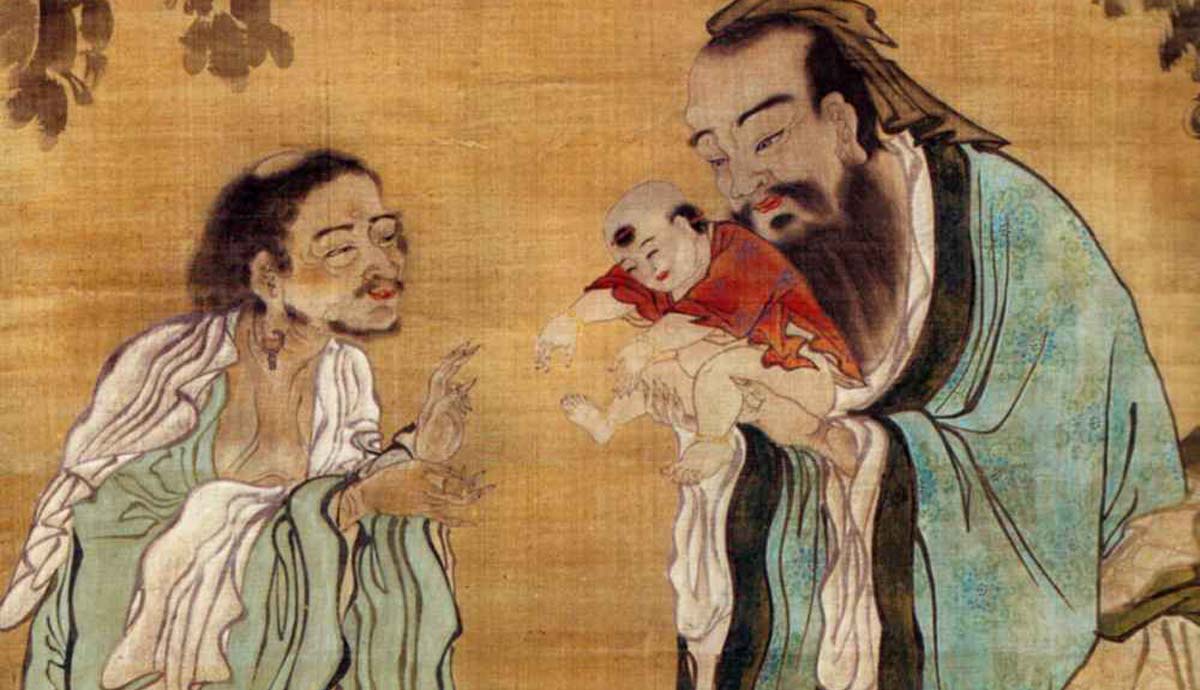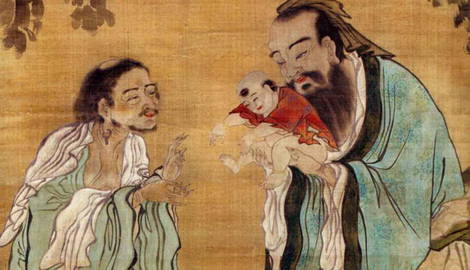
The topics of family and parenting have been of interest to philosophers ever since the discipline was born. What virtues should parents instill in their children? Is it important to have a family? How should children honor their parents? In this article, we will consider five different philosophical perspectives on these central facets of human life, ranging from the Stoics’ theories in Ancient Roman times to Buddhist ideas on parental sacrifice.
1. The Stoics on Families and Parenting in Ancient Rome

Family was deeply important in Ancient Rome. When the Stoic philosopher Seneca was writing, marriage in particular was a vital means of procreation, consolidating political power and transferring property. Due to the vulnerabilities of life in the Empire (war, childbirth, disease) many people, particularly in the upper classes, would likely end up marrying two or three times over the course of their lives. Large age gaps were normal between spouses: Seneca was a lot older than his wife Paulina, for example.
The Stoics developed specific ideas on family, and strongly encouraged men to marry and have children. Cicero held the common Stoic attitude that wise men should marry and procreate. It was a question of duty to perform this function in society alongside engaging in politics and philosophy.
During Seneca’s time, fathers and sons had a fascinating relationship. Fathers or paterfamilias wielded a lot of authority in Roman culture. They were expected to play a role in developing their son’s moral development. Seneca benefited from his own father’s teachings, particularly when it came to studying the law. His father’s collections of legal texts contain prefaces addressed to Seneca and his brothers, featuring advice on how to read the works in question.
Perhaps unsurprisingly, women’s central role in Ancient Roman society was to produce children. Within the upper classes, the day-to-day cleaning, bathing and feeding of babies and young children would have been performed by the family slaves. Mothers were responsible for disciplining their children and encouraging their child’s ambitions (successful children reflected well on their mothers). Oikeiosis was a Stoic concept describing the process which gives an individual the ability to care for others. According to Cicero, concern for one’s own well-being begins at birth, when a baby reaches for the mother’s breast. This then develops into a concern for others, an instinct which mothers will help to nurture.
2. Socrates Talks to His Son Lamprocles About the Role of Parents in Family Life

Family life in Ancient Greece was similar (though not identical) to that of Ancient Rome. The eldest male, usually the father, was in charge of the family. He was responsible for going out and earning money while the wife and any daughters stayed at home looking after children, weaving and performing other household tasks.
The famous Ancient Greek philosopher Socrates had three sons with his wife Xanthippe, the eldest of whom was Lamprocles. In book two of Xenophon’s Memorabilia, the author describes a fascinating conversation between this father and son pair. The dialogue centers around the fact that young Lamprocles keeps getting annoyed with his mother Xanthippe’s scolding.
In typical Socratic style, Socrates’ answer to this dilemma is to ask his son a lot of questions about the situation. Throughout their conversation it becomes clear that Socrates has plenty of sympathy for parental sacrifice and tries to impress this on his son. He argues that parents give children existence, and that this process comes at great sacrifice to the mother (who carries the baby for nine months then risks the perils of Ancient Greek childbirth to bring the baby into the world). Parents also get on with feeding and nurturing their babies for many years without any thanks from the child.
Overall, Socrates tries to show Lamprocles that Xanthippe behaves the way she does because of her deep-lying love for her sons. He argues that Xanthippe is not actually causing her son any physical harm when she scolds him and that her positives as a mother outweigh the negatives.
3. Buddhism, Parental Sacrifice and the Responsibility of Children

Buddhist thought shares some similarities to Socrates’ ideas, as it places the same emphasis on gratitude to our parents. For conception (and thus our very existence) to take place, the father’s sperm and mother’s egg combine. Then for nine months, the mother carries the fetus before the baby arrives.
In the Buddha’s Samyutta Nikaya he states that parents play the most important role in their child’s physical, mental, and spiritual development. Parents teach their children how to eat, speak, walk, and provide them with moral guidance. Again, as Socrates points out to his own son, they do all of this without expecting anything in return.
An interesting point arises when we think about Buddhist belief in transmigration, i.e., that after death our souls are reborn into new bodies. The Samyutta Nikaya points out that due to this process, it would be very difficult to come into contact with any being who has not at one time in the past been our mother, father or one of our siblings!

Buddhist teachings also guide followers to support their parents, and that not to do so could potentially lead our souls to be reborn in the realm of suffering. Children must remember that parents are their very first teachers, whom Buddha refers to as the brahma of the house (brahma being another word for the leading celestial being in Buddhist religion).
Overall, in Buddhism there is a strong emphasis on all of the benefits that parents provide their children with, as well as the idea that it is the utmost duty of a child to repay their parents for these benefits in later life. Indeed, one of the ways in which someone might become an outcast in society is, as the Buddha says: “Whosoever being wealthy, supports not his mother and father who have grown old, know him as an outcast.”
4. Confucius and the Importance of Filial Piety

In Confucianism, filial piety developed as a system of inheritance between parents and their children. Filial piety is a virtue involving a child’s obedience to his or her parents. Confucius called this virtue the root of goodness, alongside having respect for one’s parents. He cites xiao or filial piety as the basis of ren or love of other people and the community.
To external cultures, filial piety can seem like quite an extreme way of living. After all, it requires an individual to put the needs of their parents over themselves, their spouse and even their own children! However, for Confucius it is a vital ingredient in society. Xiao should be practiced in order to encourage familial harmony and stability.
This is because filial piety encourages a selflessness which feeds into dao, the “way of the gentleman” or the virtuous path in life. It is also deeply traditional, a ritual form of behavior which creates strong family connections. Cultivating xiao also helps maintain political stability, as it prevents children from rebelling against their parents and creating disorder in society.
Confucius uses the example of King Shun to illustrate the importance of filial piety. The strength of Shun’s piety marked him out as a worthy successor to his father, King Yao. Confucius tells his followers that such behavior involves not contesting a parent’s wishes and serving them. Filial piety continues even after the death of one’s parents: children must bury and memorialize their parents in a proper way and mourn them for three years.
5. In Search of Epicurus and His Views on How to Raise Children

Epicurus was born in 341 BC and is one of the most famous Ancient Greek philosophers. However, establishing what exactly he said about anything can prove to be a challenge, since most of the time we have to work from hearsay, translations of translations and erroneous copies of his texts.
Despite these hurdles, we can glean a few things about Epicurus’ views on marriage and children. The famous historian Diogenes Laertius points out that in On Nature and Problems, Epicurus states that a wise man may well choose to marry and father children, so long as life circumstances (e.g. money concerns) don’t get in the way. This seems like fairly sensible and unremarkable advice!
However, some Renaissance scholars took issue with this interpretation and tried to amend Diogenes’ text to say that Epicurus believed wise men should not marry and have children. This is possibly because they knew that elsewhere, Epicurus expresses hostile views towards sex and love. If Epicureans are supposed to avoid these things, then it follows naturally that children and marriage are out of the question.

We should remember though that Epicurus’ devoted follower Lucretius offers very different advice. Community is deeply important within Epicurean philosophy, and Lucretius identifies children as the main reason that communities exist in the first place. In order to protect our offspring, humans formed bonds with neighbors. Children, then, are the glue that holds society together.
According to Lucretius, Epicurus is not against people becoming parents, as long as they don’t set unreasonable expectations about what parenthood involves. An important part of deciding on whether or not to have children involves being honest about desire. As Emily Austin points out, Epicurus believes that marriage and children are natural but not necessary desires.
“Epicurus thinks a person should not be forced to pursue an extravagance they do not desire, nor should they be shamed for wanting it. In other words, if children are for you, that is great; if they are not for you, that is also fine.”
Bibliography
Austin, Emily A., Living for Pleasure: An Epicurean Guide to Life (Oxford: Oxford University Press, 2022)










